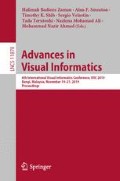Abstract
Virtual reality (VR) based stress therapy system refers to a system that applies virtual reality technology in a stress therapy session aiming to reduce mental stress. Previous studies conducted found that the system is effective in reducing stress. However, most of the studies done only aimed to measure the effectiveness of the system in reducing stress without having a guideline on how to design the virtual environment. Therefore, this paper aim to identify potential factors and its elements that must be considered when designing a virtual environment for a VR- based stress therapy application. Systematic literature review technique was employed as a guideline to search for relevant studies. The search was conducted using pre-defined keywords. Potential studies were filtered three times before it was finalised. After the selection process, the chosen studies were reviewed and important data that answers this study’s two research questions were extracted for analysis purposes. Ten studies were found to fulfil the inclusion criteria and answer all the research questions. From the review conducted, four factors were identified as aspects that should be considered when designing a virtual environment for a VR-based stress therapy application. In addition, each factor consisted of several elements.
Access this chapter
Tax calculation will be finalised at checkout
Purchases are for personal use only
References
Taneja, A., Vishal, S.B., Mahesh, V., Geethanjali, B.: Virtual reality based neuro-rehabilitation for mental stress reduction. In: 2017 Fourth International Conference on Signal Processing, Communication and Networking (ICSCN), pp. 1–5 (2017)
Rothbaum, B.O., Rizzo, A.S., McDaniel, D.D., Zanov, M.V.: Virtual reality exposure therapy. In: Encyclopedia of Mental Health, 2nd edn., pp. 370–374 (2016)
McCann, R.A., et al.: Virtual reality exposure therapy for the treatment of anxiety disorders: an evaluation of research quality. J. Anxiety Disord. 28(6), 625–631 (2014)
Marco, J.H., Perpiñá, C., Botella, C.: Effectiveness of cognitive behavioral therapy supported by virtual reality in the treatment of body image in eating disorders: one year follow-up. Psychiatry Res. 209(3), 619–625 (2013)
Menelas, B.-A.J., Haidon, C., Ecrepont, A., Girard, B.: Use of virtual reality technologies as an action-cue exposure therapy for truck drivers suffering from post-traumatic stress disorder. Entertain. Comput. 24(Suppl C), 1–9 (2018)
Rizzo, A., Hartholt, A., Grimani, M., Leeds, A., Liewer, M.: Virtual reality exposure therapy for combat-related posttraumatic stress disorder. Comput. (Long. Beach. Calif.) 47(7), 31–37 (2014)
Mahalil, I., Rusli, M.E., Yusof, A.M., Yusof, M.Z.M., Zainudin, A.R.R.: Virtual reality-based technique for stress therapy. In: 2014 4th International Conference on Engineering Technology and Technopreneuship (ICE2T), pp. 295–300 (2014)
Soyka, F., Leyrer, M., Smallwood, J., Ferguson, C., Riecke, B.E., Mohler, B.J.: Enhancing stress management techniques using virtual reality. In: Proceedings of the ACM Symposium on Applied Perception – (SAP 2016), pp. 85–88 (2016)
Mishkind, M.C., Norr, A.M., Katz, A.C., Reger, G.M.: Review of virtual reality treatment in psychiatry: evidence versus current diffusion and use. Curr. Psychiatry Rep. 19(11), 80 (2017)
Dooris, M.: Expert voices for change: bridging the silos-towards healthy and sustainable settings for the 21st century. Heal. Place 20, 39–50 (2013)
Berto, R.: The role of nature in coping with psycho-physiological stress: a literature review on restorativeness. Behav. Sci. (Basel) 4(4), 394–409 (2014)
Kitchenham, B.: Procedures for performing systematic reviews, vol. 33, no. 2004, pp. 1–26. Keele University, Keele (2004)
Kaplan, S.: The restorative benefits of nature: toward an integrative framework. J. Environ. Psychol. 15(3), 169–182 (1995)
Nordh, H., Hartig, T., Hagerhall, C.M., Fry, G.: Components of small urban parks that predict the possibility for restoration. Urban For. Urban Green. 8(4), 225–235 (2009)
Regan, C.L., Horn, S.A.: To nature or not to nature: associations between environmental preferences, mood states and demographic factors. J. Environ. Psychol. 25(1), 57–66 (2005)
Iyendo, T.O., Uwajeh, P.C., Ikenna, E.S.: The therapeutic impacts of environmental design interventions on wellness in clinical settings: a narrative review. Complement. Ther. Clin. Pract. 24, 174–188 (2016)
Nordh, H., Østby, K.: Pocket parks for people - a study of park design and use. Urban For. Urban Green. 12(1), 12–17 (2013)
Peschardt, K.K., Stigsdotter, U.K.: Associations between park characteristics and perceived restorativeness of small public urban green spaces. Landsc. Urban Plan. 112(1), 26–39 (2013)
Wang, X., Rodiek, S., Wu, C., Chen, Y., Li, Y.: Stress recovery and restorative effects of viewing different urban park scenes in Shanghai, China. Urban For. Urban Green. 15, 112–122 (2016)
Nordh, H., Alalouch, C., Hartig, T.: Assessing restorative components of small urban parks using conjoint methodology. Urban For. Urban Green. 10(2), 95–103 (2011)
Laursen, J., Danielsen, A., Rosenberg, J.: Effects of environmental design on patient outcome: a systematic review. HERD Heal. Environ. Res. Des. J. 7(4), 108–119 (2014)
Zainudin, A.R.R., Yusof, A.M., Rusli, M.E., Yusof, M.Z.M., Mahalil, I.: Stress treatment: the effectiveness between guided and non-guided virtual reality setup. In: Proceedings of the 6th International Conference on Information Technology and Multimedia, pp. 374–379 (2014)
Lui, A.K.-F., Wong, K.-F., Ng, S.-C., Law,K.-H.: Development of a mental stress relaxation tool based on guided imagery and Microsoft Kinect. In: 2012 Sixth International Conference on Distributed Smart Cameras (ICDSC), pp. 1–6 (2012)
Acknowledgement
This study was funded by Tenaga Nasional Berhad Seed Fund (U-TE-RD-18-03) in collaboration with TNB Counselling Unit. We would like to thank UNITEN R&D Sdn. Bhd. for fund management.
Author information
Authors and Affiliations
Corresponding author
Editor information
Editors and Affiliations
Rights and permissions
Copyright information
© 2019 Springer Nature Switzerland AG
About this paper
Cite this paper
Zaharuddin, F.A., Ibrahim, N., Rusli, M.E., Mohd Mahidin, E.M., Yusof, A.M. (2019). Factors to Consider When Designing a Virtual Environment to Treat Stress. In: Badioze Zaman, H., et al. Advances in Visual Informatics. IVIC 2019. Lecture Notes in Computer Science(), vol 11870. Springer, Cham. https://doi.org/10.1007/978-3-030-34032-2_4
Download citation
DOI: https://doi.org/10.1007/978-3-030-34032-2_4
Publisher Name: Springer, Cham
Print ISBN: 978-3-030-34031-5
Online ISBN: 978-3-030-34032-2
eBook Packages: Computer ScienceComputer Science (R0)

